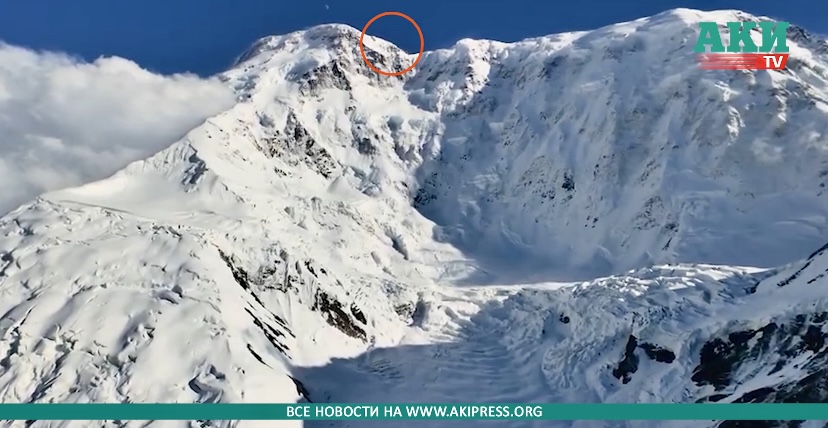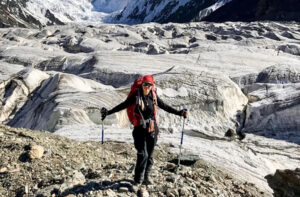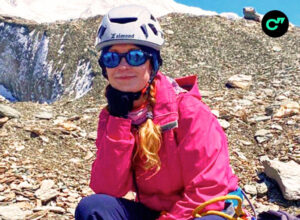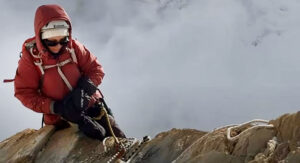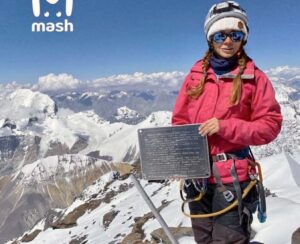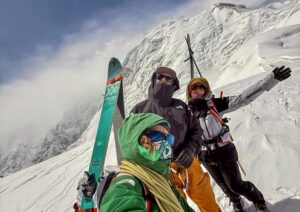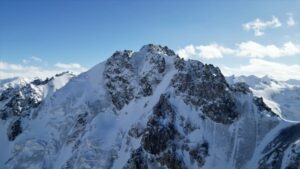Although the fate of Russian climber Natalia Nagovitsyna, stranded at 7,150m on Kyrgyzstan’s Pobeda Peak since August 12, has been obvious for several days, the last wisps of hope ended today. A few hours ago, a military drone captured thermal imaging footage of Nagovitsyna’s tent on Pobeda Peak. The images, published on the official website of the State Committee for National Security of Kyrgyzstan (GKNB), revealed no signs of life in her tent.
After more than two weeks, Kyrgyz authorities have officially declared the 47-year-old Moscow mountaineer missing — a formal designation, because they didn’t actually see her body. But the drone confirmed what everyone feared: that sometime in the 15 days since she broke her leg descending from the summit, the climber had succumbed to the brutal conditions — temperatures down to -26°C, thin air, and a lack of food and water — on one of the world’s deadliest peaks.
According to Mountain.ru, earlier drone footage from August 16 and 19 showed Nagovitsyna alive, active, and waving from her wind-torn tent, offering hope to family and rescuers. However, by August 23, worsening weather — snowstorms, high winds, and avalanche risk — forced the suspension of all rescue efforts, as reported by TASS and confirmed by Dmitry Grekov, head of the Southern Inylchek Base Camp.
Nagovitsyna’s ordeal began after she successfully summited 7,439m Pobeda, part of her quest to complete the Snow Leopard challenge by climbing all five 7,000m peaks in the former USSR.
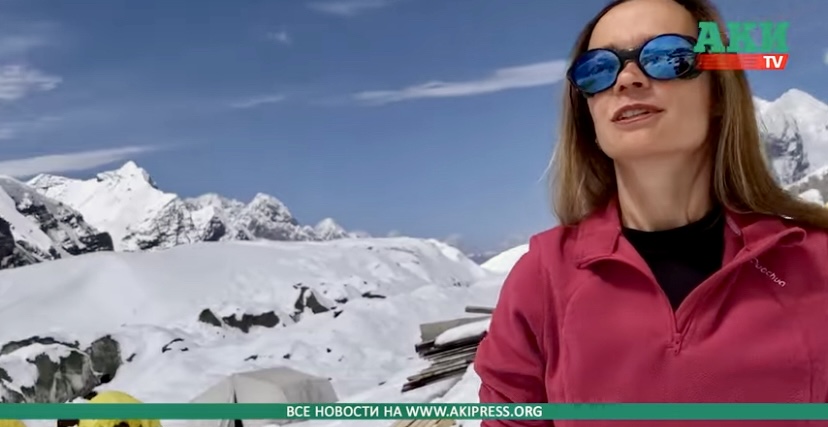
Natalia Nagovitsyna. Photo: Frame of a video posted by AKI TV
Not a guided client
According to Elena Laletina from RussianClimb, Nagovitsyna was not a guided client but part of an independent group of four climbers who had previously met on Lenin Peak. This year, they decided to climb Pobeda together. The team included Nagovitsyna, a Russian climber named Roman, Luca Sinigaglia from Italy, and Gunther Sigmund from Germany.
After Nagovitsyna broke her leg, Roman gave first aid and secured her in a tent before descending to seek help. Italian climber Sinigaglia and German mountaineer Sigmund reached her on August 13, delivering critical supplies — a sleeping bag, stove, and a gas canister. Sinigaglia then died of cerebral edema and frostbite during his descent on August 16. According to Izvestia, Sigmund also had frostbite, and on August 20, he returned to Germany for further medical treatment.
Subsequent rescue attempts, including a ground team that made it to 5,800m and plans for an Italian-led helicopter evacuation, were thwarted by relentless storms and logistical challenges. According to Mountain.ru, two days ago, the rescue mission officially ended due to bad weather. The Italian pilots left, and the climbing season closed.
On August 23, Grekov, the base camp manager, told TASS that no climber had ever been rescued from so high on Pobeda Peak. Kyrgyz helicopters can’t reach such an altitude. Hopes of retrieving Nagovitsyna’s body, along with that of Sinigaglia, are now deferred to spring 2026.
Nagovitsyna’s husband also died nearby
The mountains were not kind to Nagovitsyna. In 2021, her husband, Sergey, died of a stroke at 6,900m on nearby Khan Tengri. Nagovitsyna refused to leave his side and stayed with him until the end. She later returned to place a memorial plaque.
According to Izvestia, on August 26, her son, Mikhail Nagovitsyn, appealed to Russian authorities, including the Investigative Committee of Russia, for aid. News-Pravda.com reports that this Committee has begun an investigation into the incident.
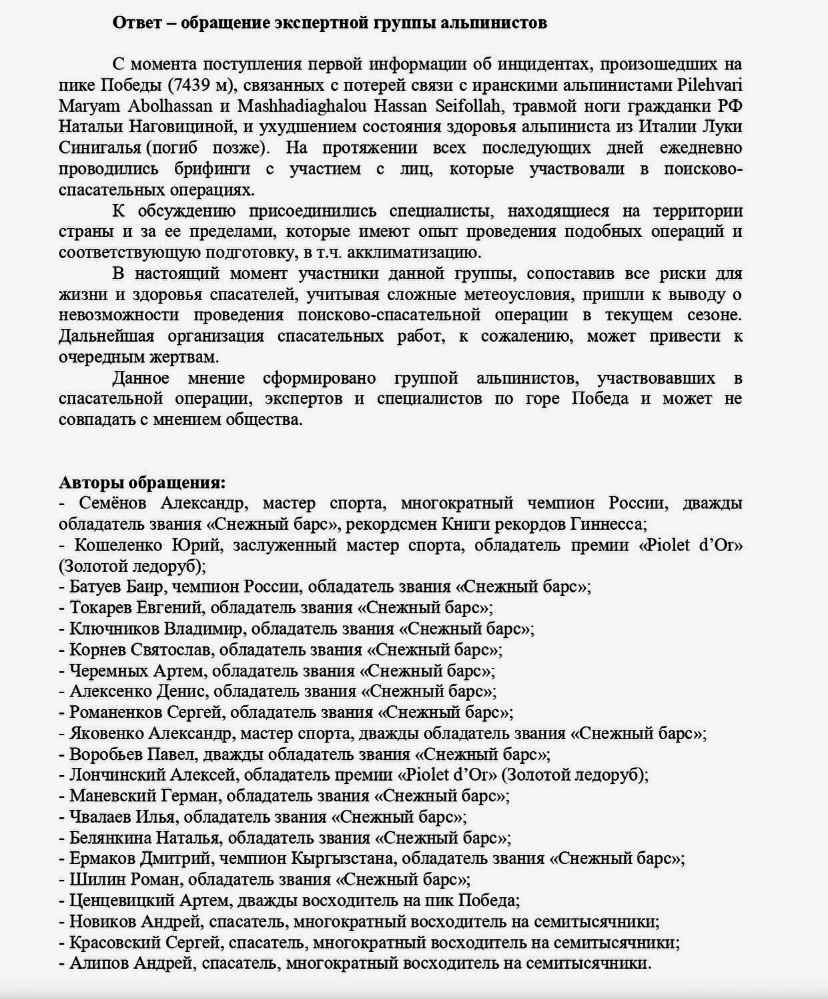
Recent statement posted on Ak-Sai Travel’s Facebook page.
Mountaineers comment
Ak-Sai Travel, a key organizer of mountaineering expeditions in the region, posted a statement on Facebook today from a list of experienced mountaineers. Translated into English, the statement says:
“Since the initial reports of incidents on Pobeda Peak (7,439m) involving the loss of contact with Iranian climbers Pilehvari Maryam Abolhassan and Mashhadiaghalou Hassan Seifollah, a leg injury to Russian citizen Natalia Nagovitsyna, and the deteriorating health of Italian climber Luca Sinigaglia (who later died), daily briefings have been held with participants involved in the search-and-rescue operations.
“Specialists with relevant training, including acclimatization…joined the discussions.
“After assessing all risks to the lives and health of rescuers and considering the challenging weather conditions, [this group] has concluded that conducting a search and rescue operation this season is not feasible…[and] may lead to additional casualties.
“This opinion was formed by the group of climbers involved in the rescue operation, experts, and specialists on Pobeda Peak and may not align with public opinion.”
The statement was signed by many mountaineers who had previously summited Pobeda, including several Snow Leopard recipients.
The drone video shows Natalia Nagovitsyna and her tent on Pobeda:
